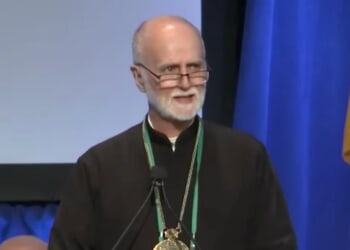Perhaps somewhere in America this week, a high school history teacher will assign his students to prepare for a debate on the question, “Was Gavrilo Princip justified in assassinating Archduke Franz Ferdinand?” And while they’re studying that, the teacher should encourage them to consider some related questions, e.g., “Were the terms of the Austrian ultimatum to Serbia in July 1914 reasonable?” and, “Was it a mistake for Czar Nicholas to order Russian military mobilization in response to the July crisis?”
[O]ne can scarcely blame conservatives … for seeing the assassination of Charlie Kirk as a non-coincidental dot in a larger pattern of left-wing violence.
An informed discussion of recent events requires some sense of history, a sense that seems lacking in many of the loudest voices clamoring on TV and social media since the assassination of Charlie Kirk. Not only has the study of history declined in recent decades, but many Americans — including some whose job is to teach history — seem to have no idea of why the subject is so important to a proper education.
We teach history in order to prepare young people to exercise their duties as citizens involved in the project of self-government. Once upon a time, when our government was more aristocratic in nature, a knowledge of history was considered particularly necessary for those gentlemen who were either born into the leadership caste, or who aspired to reach that station in life. It mattered little whether the mechanic or mill hand knew anything about ancient Rome or the Norman conquest, but such knowledge was considered essential to the nation’s future statesmen and others (including journalists) who would participate in shaping public policy.
Many others have remarked how the democratizing of education has resulted in a lowering of standards, and I would add that it has also led to a loss of the sense of why education is important, or what its goals should be. Decades ago, Newt Gingrich quipped that high school has become nothing more than “subsidized dating,” and pointed out that nowadays we hand diplomas to teenagers who can’t even read their diplomas. Certainly most high school graduates know little if anything about the crisis that led to the First World War, and I doubt you could have an intelligent discussion of the subject with many college seniors.
Any reasonably informed student of history could see that assassination seldom accomplishes whatever the assassin sought to achieve by his deed. Gavrilo Princip might be an exception to that general rule, given that (a) the assassination in Sarajevo immediately led to a war that destroyed the Austro-Hungarian Empire and (b) after much subsequent struggle and oppression, Serbia is today an independent nation.
However, even if anyone could defend what Gavrilo Princip did, it must be admitted that assassination generally produces a backlash against whatever “cause” the assassin seeks to advance. Brutus and his co-conpsirators sought to defend the Roman Republic by stabbing Julius Caesar, and instead merely hastened the end of the Republic. John Wilkes Booth sought to avenge the South, and instead inspired the wrath of Radical Reconstruction.
We do not know if Tyler James Robinson ever gave any thought to such matters. The 22-year-old accused of killing Charlie Kirk at Utah Valley University has apparently not provided any detailed account of why he thought a .30-06 bullet was the best way to “win” an argument. Available evidence and testimony indicates that Robinson had in recent years become alienated from his own conservative family and was involved in a homosexual relationship with Lance Twiggs, who was “transitioning” to a female identity. Court documents quote text messages from Robinson referring to Twiggs as “my love,” and stating his motive for Kirk’s murder bluntly: “I had enough of his hatred. Some hate can’t be negotiated out.”
Suspicions of a wider conspiracy behind this crime may or may not be justified, but are likely to result in more critical scrutiny of transgender activism and a federal crackdown on Antifa militants who some see as part of a larger network of violent radicalism. It may be that Tyler Robinson was a “lone wolf,” and that he bears sole responsibility for the crime of which he is accused. However, one can scarcely blame conservatives — including President Donald Trump and powerful officials in his administration — for seeing the assassination of Charlie Kirk as a non-coincidental dot in a larger pattern of left-wing violence.
A single shot fired by a misguided young man can have consequences far beyond anything the assassin ever intended and, historically, the results are contrary to those intentions. The death of Charlie Kirk likely bodes ill for those who think they can win arguments about public policy by labeling their antagonists as proponents of “hate,” but it bodes ill for us all, unless and until we take heed of history’s lessons. History tells us who we are as a nation, and certainly Charlie Kirk would have reminded us that we owe our independence to those who, in a time of crisis, vowed their “firm reliance on the protection of divine Providence.” May it always be thus.
READ MORE from Robert Stacy McCain:





![Gavin Newsom Threatens to 'Punch These Sons of B*thces in the Mouth' [WATCH]](https://www.right2024.com/wp-content/uploads/2025/08/Gavin-Newsom-Threatens-to-Punch-These-Sons-of-Bthces-in-350x250.jpg)
![ICE Arrests Illegal Alien Influencer During Her Livestream in Los Angeles: ‘You Bet We Did’ [WATCH]](https://www.right2024.com/wp-content/uploads/2025/08/ICE-Arrests-Illegal-Alien-Influencer-During-Her-Livestream-in-Los-350x250.jpg)







